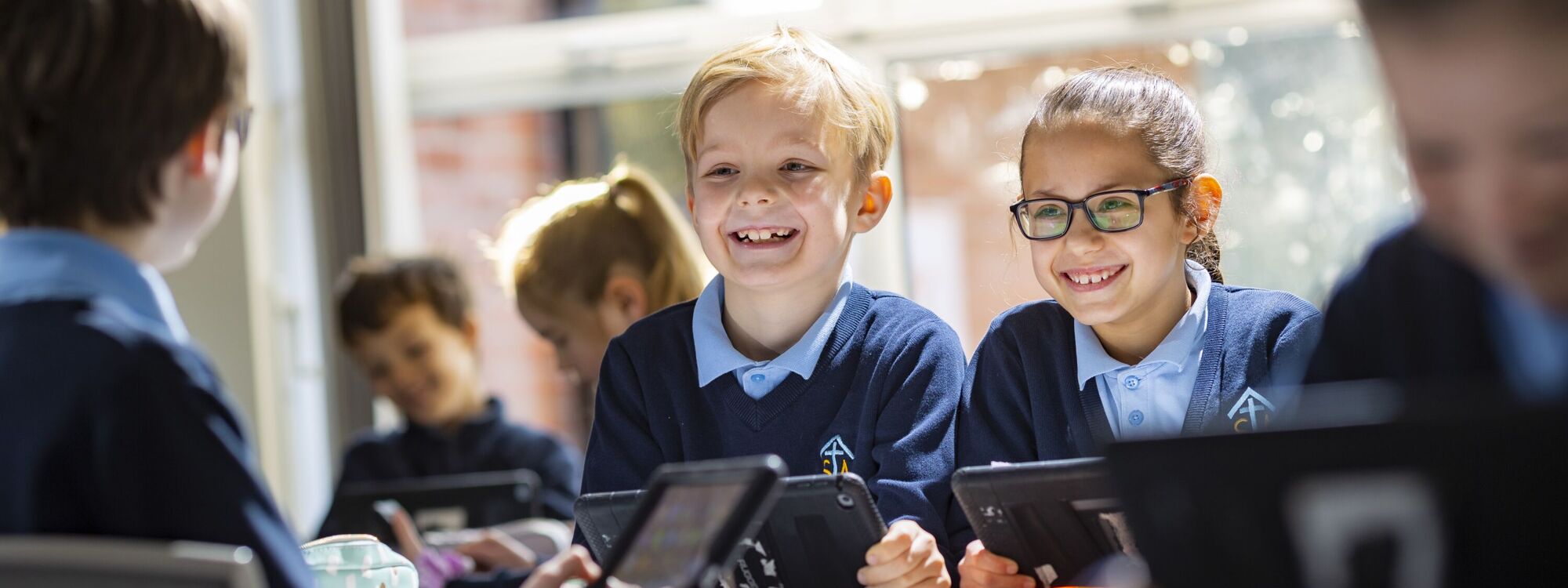
- Home
- Curriculum
- Subject Information
- Science
Science
Intent
At St Augustine’s Catholic Primary School, we aim to assist each child in their development of a lively and enquiring mind, in order for them to realise their potential for life-long learning.
We encourage all children to develop and use a range of enquiry skills including observing, planning and investigating. We encourage all children to question the world around them and become independent learners in exploring possible answers for their scientifically based questions.
Specialist vocabulary for topics is taught and built up, and effective questioning to communicate ideas is encouraged. Through a focus on scientific enquiry, we aim to reinforce concepts taught and engender in pupils a curious and enquiring mind.
The staff at St Augustine’s Catholic ensure that all children are exposed to high quality teaching and learning experiences, allowing them to explore the outdoor environment and locality and to develop their scientific enquiry and investigative skills. They are immersed in scientific vocabulary, which aids children’s knowledge and understanding not only of the topic they are studying, but of the wider world.
Through the science curriculum, we aim to encourage children to co-operate with each other and to be sensitive to the needs of others, promoting in them a respect for all of God's creation. We intend to provide all children regardless of ethnic origin, gender, class, aptitude or disability, with a broad and balanced science curriculum.
Through our Science Principles, we ensure the children at St Augustine’s develop not only their knowledge but other important values such as teamwork, engagement, making links, reasoning, exploring, stewardship, play and having fun.
Science is good when….
We Explore
We work as a team
We play
We reason why and how to prove it
We investigate
We are stewards to God’s world
We have fun and enjoy learning
Implementation
In ensuring high standards of teaching and learning in science, we implement a curriculum that is progressive throughout the whole school. All teachers are involved in planning for science to ensure that the school gives full coverage of, ‘The National Curriculum programmes of study for Science 2014’ and, ‘Understanding of the World’ in the Early Years Foundation Stage.
Science teaching at St Augustine’s Catholic Primary School involves adapting and extending the curriculum to match all pupils’ needs. Where possible, Science is linked to class topics. Science is taught as discrete units and lessons when needed to ensure coverage. Teachers plan to suit their children’s interests, current events, their own teaching style, the use of any support staff and the resources available. We old regular science focus weeks to enhance and enrich the children’s experience of science.
We ensure that all children are provided with a rich learning experience that aims to:
· Prepare them for life in an increasingly scientific and technological world today and in the future.
· Help them acquire a growing understanding of the nature, processes and methods of scientific ideas.
· Build on their natural curiosity and develop a scientific approach to problems.
· Encourage open-mindedness, perseverance and the development of enquiry skills, including: observing, measuring, predicting, hypothesising, experimenting, communicating, interpreting, explaining and evaluating.
· Develop the use of scientific language, recording and techniques.
· Develop the use of maths and computing in investigating and recording.
· Make links between science and other subjects.
Science is taught consistently, once a week for up to two hours.
Impact
The impact and measure of this is to ensure children not only acquire the appropriate age-related knowledge linked to the science curriculum, but also skills which equip them to progress from their starting points, and within their everyday lives.
All children will have:
· A wider variety of skills linked to both scientific knowledge and understanding, and scientific enquiry/investigative skills.
· A richer vocabulary which will enable to articulate their understanding of taught concepts.
. High aspirations, which will see them through to further study, work and a successful adult life.
Children’s progress is monitored throughout their time at St Augustine’s Primary School and is used to inform future teaching and learning. By the end of each key stage, pupils are expected to know, apply and understand the matters, skills and processes specified in the relevant programme of study as set out in the National Curriculum. These are set out as statutory requirements. We also draw on the non-statutory requirements to extend our children and provide an appropriate level of challenge.
Children receive effective feedback through teacher assessment, both orally and through written feedback when appropriate in line with the schools marking policy.
Children are guided towards achievement of the main objective by effective questioning, teaching and resources that provide them with the skills and knowledge to achieve the learning intention.
Assessment for learning is continuous throughout planning, teaching and learning.
Assessment strategies include:
· Observing children at work, individually, in pairs, in a group, and in classes.
· Questioning, talking and listening to children.
· Considering work/materials / investigations produced by children together with discussion about this with them.